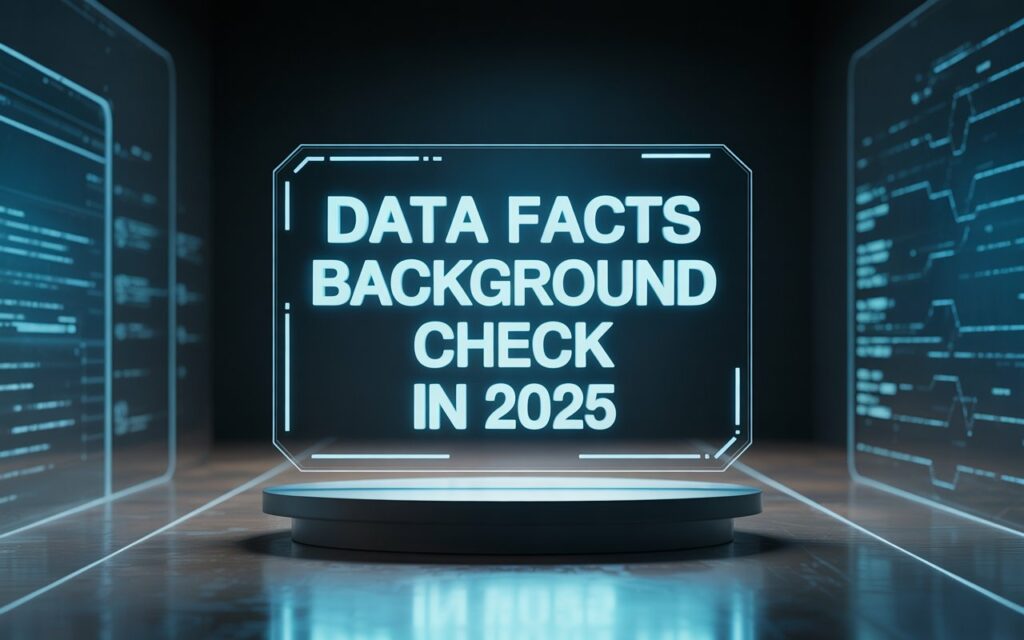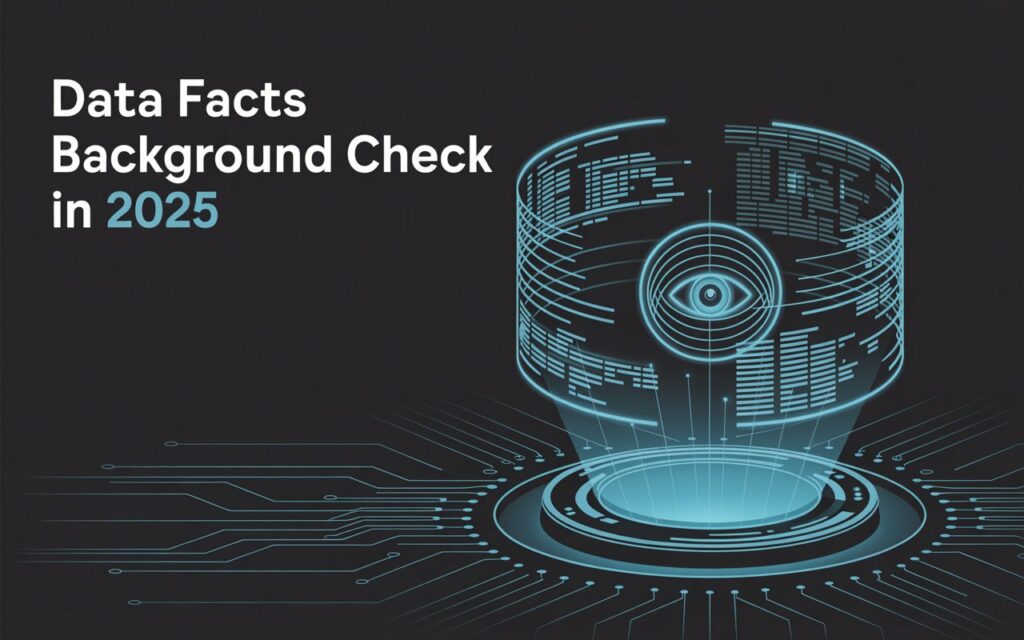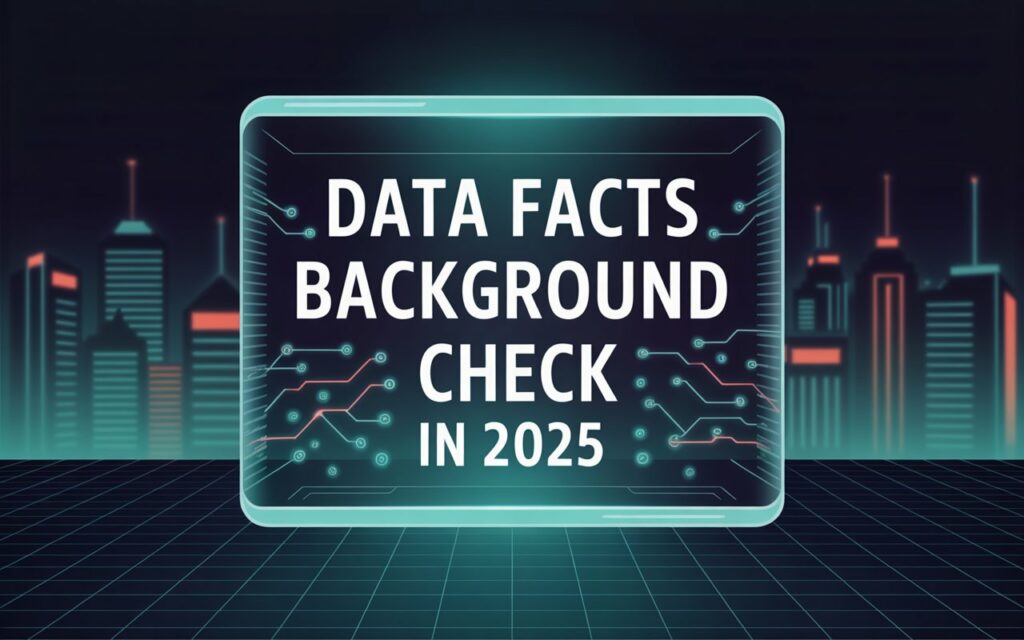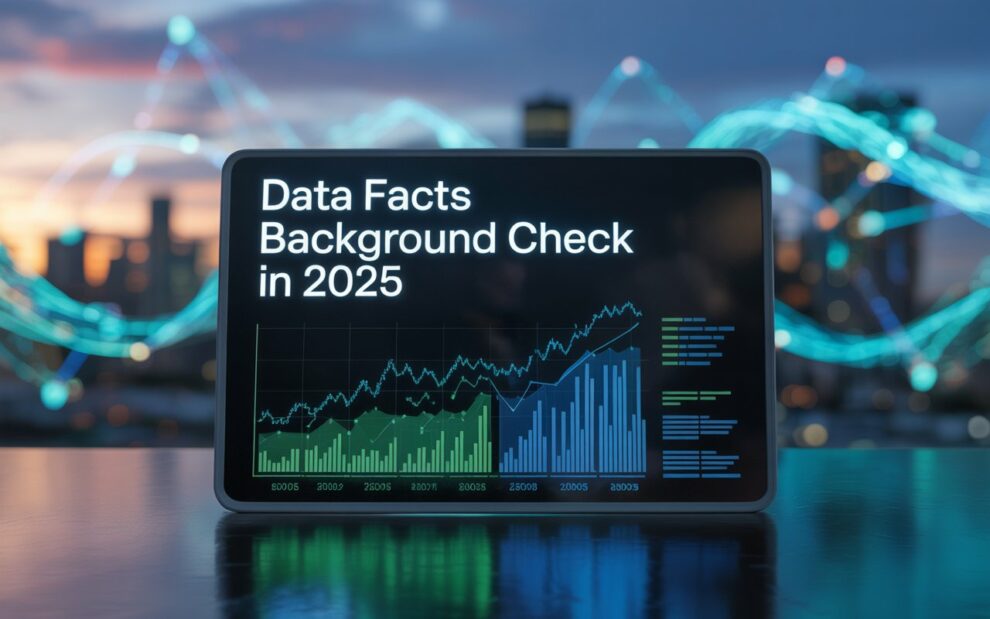Data Facts Background Check in 2025: What You Need to Know for Smarter Hiring and Enhanced Security.
Table of Contents
In 2025, background checks are more crucial than ever for making informed hiring decisions, ensuring workplace safety, and maintaining regulatory compliance. With trusted providers like Data Facts, employers gain access to comprehensive screening tools that go beyond basic criminal history. Whether you’re an HR professional, business owner, or job seeker, understanding how Data Facts background checks work and why they matter is key to navigating today’s employment landscape.
This guide explores the importance of background checks, the role of Data Facts, legal considerations, privacy issues, and what to expect when screening applicants—locally or globally.
The Importance of Data Facts in Background Checks
Data Facts is a nationally accredited background screening company that offers reliable, compliant, and customizable background check solutions. In 2025, their services remain at the forefront of helping employers verify candidate information, mitigate hiring risks, and comply with federal and state regulations.
Key features of Data Facts background checks include:
- Real-time access to county, state, and federal criminal records
- Employment and education verification
- Drug screening
- International screening
- Compliance tools for FCRA, EEOC, and state laws
Using Data Facts helps businesses make smarter hiring decisions with trustworthy, legally sound data.
How Background Checks Enhance Workplace Safety

In 2025, employers face growing challenges in safeguarding both their workforce and company assets. Background checks are a vital tool in this process, and here’s how they contribute to a safer work environment:
- Prevent Workplace Violence: Verifying criminal histories can uncover patterns of violent behavior. This helps employers avoid hiring individuals with a record of aggression or threats, reducing the risk of future incidents.
- Protect Sensitive Data and Client Information: Many jobs involve handling confidential or financial data. Background checks help ensure that employees entrusted with sensitive tasks are reliable and trustworthy.
- Reduce the Risk of Theft or Fraud: Financial background checks, credit history reviews, and previous employment behavior can signal potential risks, helping businesses avoid insider theft or embezzlement.
- Ensure a Safe Environment for Employees and Customers: Screening helps identify candidates who align with the organization’s values and safety standards. This fosters a secure and respectful workplace culture.
By catching red flags before someone is hired, companies avoid costly legal issues and foster trust among their staff and clients.
Understanding the Different Types of Background Checks
Background checks vary depending on the job role, industry, and jurisdiction. Here are the most commonly used types in 2025:
- Criminal History Checks: These searches span local, state, and federal records. They may include warrants, arrests, convictions, and inclusion on sex offender registries.
- Employment Verification: Confirms the candidate’s job titles, employment duration, responsibilities, and reasons for leaving. This guards against resume fraud.
- Education Verification: Validates diplomas, degrees, and the institutions attended. Essential for roles requiring specific academic qualifications.
- Credit Checks: Often used for financial or sensitive roles, these assess a candidate’s financial responsibility. Poor credit may raise red flags in positions involving money management.
- Motor Vehicle Reports (MVRs): Required for roles that involve driving. These reports show license status, infractions, and DUIs.
- Drug Screening: Employers may require pre-employment or random drug testing to ensure compliance with workplace substance policies.
- Professional License Verification: Confirms the candidate holds valid and current certifications, such as nursing licenses, CPA credentials, or teaching certifications.
- Social Security Number (SSN) Trace: Used to confirm identity and locate alias names or address history, which can be cross-checked with other records.
Common Misconceptions About Background Checks

| Myth | Fact |
|---|---|
| Only criminals fail background checks | Mistakes in education or employment claims can also trigger red flags. |
| Employers don’t need permission | The Fair Credit Reporting Act (FCRA) requires written consent. |
| All background checks are the same | Checks differ based on role, risk level, and legal compliance. |
| Old records always show up | Expunged or sealed records often do not appear in reports. |
| Background checks delay hiring | Modern providers like Data Facts offer fast, accurate results—often within 24–72 hours. |
Legal Considerations When Conducting Background Checks
Understanding the Fair Credit Reporting Act (FCRA)
The FCRA is the federal law that governs the use of consumer reports—including background checks. Key compliance requirements for employers:
- Written Consent: Employers must obtain written permission before running a check.
- Pre-Adverse Action Notices: If the report may negatively affect hiring decisions, employers must first notify the candidate and give them time to respond.
- Report Access: Candidates must be given a copy of their report and a “Summary of Rights.”
- Dispute Window: The applicant must be allowed time to correct or explain any discrepancies.
Non-compliance can result in severe penalties, including fines and lawsuits.
State Laws and Regulations
In 2025, state-specific laws have become stricter and more widespread:
- Ban-the-Box Laws: Prohibit asking about criminal history on initial job applications to avoid early discrimination.
- Time Limit Rules: Limit how far back certain offenses can be reported—especially non-convictions.
- Credit Report Restrictions: Some states disallow using credit reports for non-financial positions.
Employers should consult legal counsel or use a compliant provider like Data Facts to stay updated.
EEOC Guidelines
The Equal Employment Opportunity Commission (EEOC) enforces anti-discrimination in hiring. Employers must:
- Avoid policies that unfairly affect protected classes (race, gender, age, etc.)
- Consider the “Green factors”:
- Nature and gravity of the offense
- Time passed since the offense
- Relevance of the offense to the job
Using blanket exclusions (e.g., “no felons allowed”) may be considered discriminatory.
Privacy Considerations

With the digitization of personal data, privacy is a top concern in 2025. Employers and background screening agencies must:
- Use encrypted platforms to collect, store, and transmit data
- Limit data collection to only what is job-relevant
- Follow clear consent protocols
- Avoid sharing data without explicit permission
Data Facts complies with national and international privacy laws and uses robust security measures to protect applicants’ sensitive information
International Background Checks
Remote work and global recruiting trends mean more companies now hire talent from outside the U.S. International background checks include:
- Criminal Background Checks: Depending on the country, this may involve police certificates or court records.
- Education Verification: Verifying academic credentials earned abroad.
- Employment History: Checking foreign work experience.
- Data Privacy Compliance: Aligning with international laws like GDPR (EU) or PIPEDA (Canada).
Data Facts partners with global data networks to provide seamless international screening, making it easier for U.S. companies to hire safely and legally across borders.
FAQs About Data Facts Background Checks in 2025
1. How long does a background check from Data Facts take?
Most checks are completed in 24–72 hours, though international or complex checks may take up to 7 days.
2. Will I be notified before a background check is done?
Yes. Federal law requires written consent before any screening can begin.
3. What if there’s a mistake on my background report?
You have the right to dispute inaccurate information and request a corrected report.
4. Can a minor offense disqualify me from employment?
Not always. Employers often consider the type of offense, how long ago it occurred, and its relevance to the job.
Conclusion
As of 2025, a Data Facts background check is more than just a hiring formality—it’s a critical component of building trustworthy, secure, and compliant organizations. Employers must understand the types of checks available, the laws governing them, and how to use the results responsibly. Likewise, job seekers should be proactive in ensuring their records are accurate and complete.
Whether you’re expanding your team or applying for your dream job, staying informed about background checks will give you a competitive and compliant edge.
Do Follow Dragcast on Social Media For More Such Content.












Add Comment